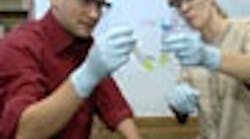More Columns By Mark Rosenzweig
How Should Industry Tackle Threats?
Give an Enduring Gift
Houston, We Have Lift-off
Rosenzweig's Ramblings: Chemical Processing Turns 70
Rosenzweig's Ramblings: Wireless Takes Center Stage
Anything that raises the public's awareness of chemical engineers' positive role deserves applause. After all, far too few people appreciate contributions that members of the profession already have made to improve life and the environment or the potential impact of chemical engineers in addressing today's pressing problems. Getting such a message out broadly and effectively, of course, makes us feel good about our career choice. More importantly, though, it can help entice children to go into the field. As I pointed out recently ("Convince a Child to Explore Engineering," www.ChemicalProcessing.com/articles/2009/015.html), American youngsters generally lack interest in engineering, a situation undoubtedly exacerbated by their unfamiliarity with what engineers do.So, we all should cheer on — and talk up — an educational Web site, www.chemicalengineering.org, just launched by the Chemical Heritage Foundation (CHF), Philadelphia, and the American Institute of Chemical Engineers (AIChE), New York City."This site is designed for adults and students in the higher grades who are curious about chemical technologies and who want to improve their scientific literacy," notes Peter Lederman, CHF board member and AIChE member, who led the project. Dozens of volunteers and staff took part in the effort, which included getting feedback from teachers, parents and students.The home page, "Chemical Engineers in Action — Innovation at Work," clearly sets out the aim of the site:"Chemical engineers have been improving our well-being for more than a century. From the development of smaller, faster computer chips to innovations in recycling, treating disease, cleaning water, and generating energy, the processes and products that chemical engineers have helped create touch every aspect of our lives."This Web site celebrates the many significant advancements that chemical engineers have made to our world. Explore the site to learn more about chemical engineering's great achievements, bold innovators, and new frontiers in the fields of energy, the environment, biomedicine, electronics, food production, and materials."Six tabs on the home page — generating energy, saving the environment, advancing biomedicine, developing electronics, enhancing food production, and improving materials — direct visitors to pages that provide more information on each subject. Each page boasts a consistent format, starting with a brief overview of chemical engineers' roles in that area, and, below that, three vertical sections labeled "Achievements," "Innovators," and "Frontiers" with some information to pique interest — corresponding tabs lead to pages with more specific details.For instance, "generating energy" cites achievements in traditional refining, synthetic liquid fuels, biofuels, and electricity from coal. It spotlights three innovators: Vladimir Haensel of Universal Oil Products for coming up with the platforming process for making less-expensive gasoline with greater energy content; Donald Katz of the University of Michigan for pioneering the field of petroleum reservoir engineering; and Eger Murphree of Standard Oil Development Co. (which became Esso Research and Engineering) for leading the efforts to develop synthetic toluene, fluid catalytic cracking and other advances. The frontiers discussion focuses on renewable and nonconventional sources of energy, namely, hydrogen fuel, solar and wind power, and nuclear energy.A project like this necessarily must be selective — and you certainly may not agree with some of the particular picks. I imagine the team had a hard time narrowing down its choices. It cites two women as innovators — Margaret Hutchinson Rousseau, the first female member of AIChE, and astronaut Mae Jemison (both under "advancing biomedicine") — which may help girls visiting the site better foresee a career for themselves in the profession.A site that aims to inform a general audience about technology mustn’t come across as dense and dry. It must engage people. Chemicalengineering.org tries. It includes "Did you know?" snippets on the achievements, innovators and frontiers pages. For instance, the energy-generation achievements page points out that chemical engineers produced the first high-octane gasoline in 1937 using catalytic cracking. Probably more fascinating to many visitors is the note on the enhancing-food-production innovators page that Waldo Semon, a chemical engineer, invented bubble gum. But such fun factoids are few and far between. That's fine with me. Indeed, I'd complain if there were many offbeat entries. After all, the intention is to educate, not entertain, visitors. It'll be interesting to see what traffic the site develops and how significantly it publicizes the positive contributions of chemical engineers and chemical engineering. As an editor, it's my nature to be somewhat skeptical about the impact of such an effort. However, as a chemical engineer, I certainly commend the groups for trying and hope the site succeeds. 